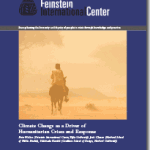This paper explores the relationships between climate change, humanitarian crises and humanitarian response through a review of published and grey literature. We examine the historical evidence for associations between climate change and humanitarian crises, and move on to a brief review of present humanitarian crises directly attributable to disasters triggered by climatological events. Finally, we look at three interrelated aspects of future trends: changing weather patterns, increasing societal vulnerabilities, and shifting demographics. We conclude with some thoughts on the policy and practical implications for the aid community, academia, and donor and crisis-affected states, emphasizing the need to shift from a mindset in which crisis response is exceptional and interventionist to one in which managing crises is seen as the norm, part of sovereignty and internalized within more formal international and national arrangements.
Climate Change as a Driver of Humanitarian Crises and Response

June 2012
ASSOCIATED PROJECT
SUBJECTS
PUBLICATION TYPE
LOCATION
RELATED PUBLICATIONS
The time pressure involved in designing and implementing anticipatory action can discourage the localization of decision-making. Learn more from a cartoon-infused summary of insights.
•
July 2024
Early Warning Systems can reduce deaths and damages caused by extreme weather events, if investors address gaps in communication and planning. Learn more from a cartoon-infused summary of insights.
•
July 2024
This synthesis report reflects upon Phase 1 findings on humanitarian action in pastoral drylands of the Greater Horn and Sudano-Sahel.
•
June 2024
This desk study examines common perceptions of pastoralism among humanitarians and barriers to international humanitarian systems meeting pastoralists’ needs.
•
June 2024
This desk study explores how state-owned policies and programs in pastoral areas of the Sudano-Sahel and the Greater Horn of Africa meet pastoralists’ needs and priorities.
•
June 2024
This desk study explores how pastoralists manage climate, conflict, and other stresses through indigenous early warning systems, preventive actions, local emergency responses, and customary safety nets.
•
June 2024






